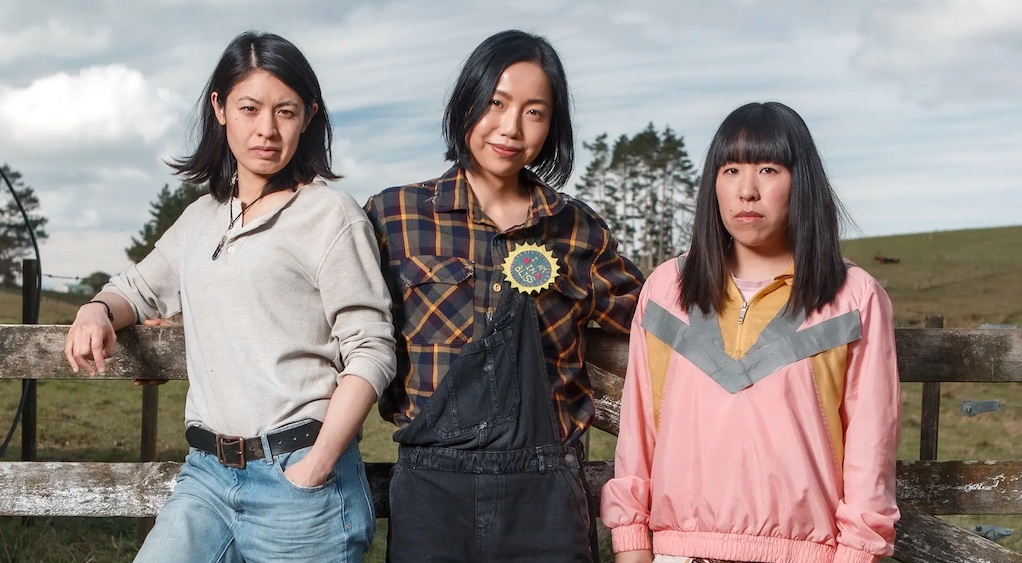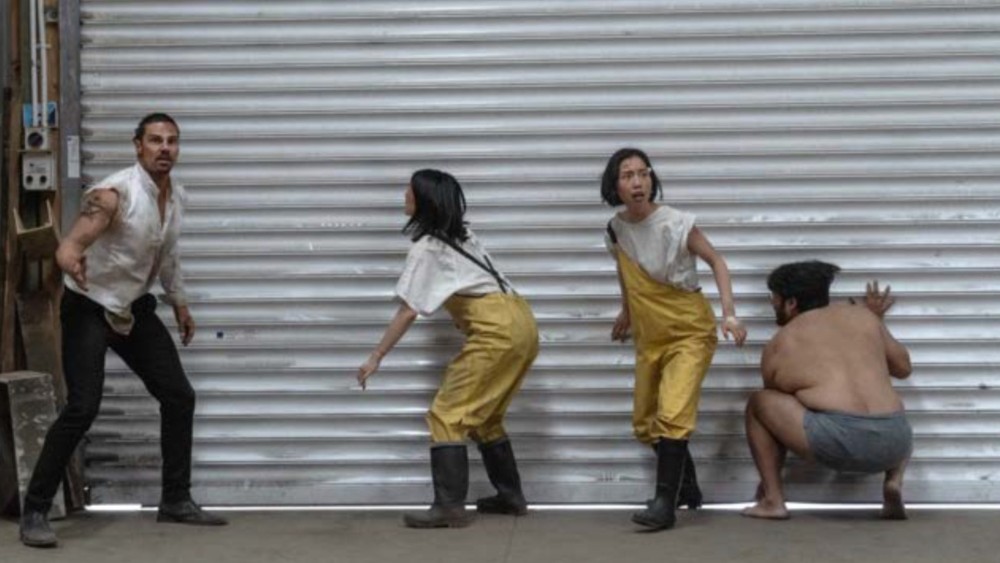
Creamerie is a funky, punk-rock television series. Conceived by creators Roseanne Liang, J.J. Fong, Perlina Lau, and Ally Xue, the dark comedy is drawn to the unexpected, much like a moth to a flame. Set in a world where few men exist, three friends embark on adventures brimming with conspiracies, hijinks, death, trauma, and more.
This New Zealand-based show doesn’t play it safe.
Musically, composer Mahuia Bridgman-Cooper leans into the story’s genre-bending. Previously, he collaborated with Liang on Shadow in the Cloud, where he delivered a propulsive score. With two seasons of Creamerie under his belt, the composer took the time to discuss his creative process for the series and the show’s terrific cover songs in an interview with Below the Line.
[Note: This interview has been edited for clarity and length]
Below the Line: Season two is bigger as far as the action, tone, and scale goes. How’d you want the score to evolve with the expanding vision for the show?
Mahuia Bridgman-Cooper: Yeah, we also explore the darkness a bit more. Even though the tone changes a lot, we do stay in the same place for a little longer. So as a composer, that gives you a bit more to play with in terms of creating a real emotion and making sure it hits home. The main thing is always try and do what we do a little bit more effectively.
We’ve got a bit more space, we’ve got a bit more time, but apart from that, it is always a bit of a whiplash style of Creamerie where you’re going along and suddenly it changes. So, you have to hit those moments and keep it within the original idea of what the Creamerie score is, which is meant to be a little bit uncomfortable and a little bit wacky and a little bit kooky and a little bit sort of lo-fi, too.
BTL: With the varying tones, as a composer, do you feel like you have to help guide the tone or preserve those whiplashes? How do you handle that musically?
Bridgman-Cooper: At the essence of the show, it’s a comedy, and with comedy, you don’t want to play the comedy. So, those are the broad guidelines. It takes some getting used to finding that sweet spot, and I think in season two, we have got there, we are better at it.
Season one is just like, whoa, let’s try this thing and see how it flies. Season two, when you get the whiplash moments again within the palette, once people buy into it, it becomes an easier proposition. I feel we’re all just getting better at refining that and making it more effective.
BTL: Season two opens with an action scene that involves both a Terminator 2 homage and sperm used as a hostage. It sets the tone nicely. Right from the beginning with that set-piece, how’d you want to help Roseanne set that tone?
Bridgman-Cooper: Yeah, I mean, Roseanne’s amazing. She is always pushing the envelope and she has got so many great pop culture references, whether you spotted them or not. The opening had to hit really hard because of the last ending of season one, right? We do open with a cue that is from season one, which suits the hectic pace of the fight scene where you can push the momentum forward and keep it zinging.
BTL: There’s also a Donnie Darko reference with a lovely “Head Over Heels” cover. Was that source music or did you work on that cover?
Bridgman-Cooper: Yeah, yeah, I produced and recorded all of the covers with Reb Fountain, a good friend and local artist, so if anyone likes her voice, check out Reb Fountain. She’s got some great records out. She’s sort of the cover voice of Creamerie, and we do a bunch of different covers. It’s great fun doing little Creamerie style twists on those songs and keeping it with the same vocal artist. So, you get this kind of almost sort of commentary.
BTL: When you produce a cover, how do you want to respect what the original artists did but also depart for the tone of Creamerie?
Bridgman-Cooper: Yeah, it was always difficult, always. Actually, it went around in circles a bit on that particular one because you don’t want to just try and replicate the great song. With Reb, she’s great because she’s got such a unique voice, so it is a bit of back and forth and trying things out to get to that stage, but that’s of all the songs in the show that gave us the most trouble getting to the end destination. It is strange. I’ve actually had a few people from around the world hit me up and say, “Where can I get that cover?”
BTL: I couldn’t find it. Will that be available anywhere?
Bridgman-Cooper: Yeah, I’m just currently a bit swamped on other projects, but I need to get out a Creamerie soundtrack for season one and two. Hopefully, by the end of the year it will come out.
BTL: How’s your collaboration with the music supervisor? Any difficulty getting the song rights?
Bridgman-Cooper: Well, it’s a crazy world out there with the licensing, right? It’s surprising how many songs that you think are going to be super hard to get or super expensive, and then for the right project, they come in and say, “Oh, no, we will make it affordable.” So, that wasn’t too difficult.
There were a bunch of songs from more indie artists that we weren’t able to use because they came in a bit too high or they said, “We don’t want to license our song.” So yeah, there were a few changes of, “Oh, let’s see how we can write something that might do the job there.” I like to imagine Burt Bacharach watching the finale of season one and being like, “We’re down to give this our music.”
BTL: When are those moments for you as a musician, knowing when I don’t need to amplify what’s happening here, or this is when I go quiet as a composer?
Bridgman-Cooper: I think that’s the real skill is being able to judge those moments and know where that line is to get the tone to bring either a laugh or more authenticity to the show. I find the trickiest moments, especially in a show like Creamerie, where it’s a lot of dry comedy and the jokes aren’t always in your face, and then it hits this really emotional, authentic love emotion or a fear emotion, you’ve got to be careful how far you push it.
Mind you, that said, there is a lynching scene, which is just go the whole way and make this really disturbing because Creamerie does tackle all. At the heart of it, it is pointing out all these issues we have in society with politics, gender relations, and people suffering.

BTL: Do you write themes for the main ensemble or do you mostly focus on atmosphere?
Bridgman-Cooper: No, there hasn’t been a character theme through it. There has definitely been an emotional theme going through. There’s certain parts that there’s a couple of, well, when Creamerie does a love scene, there is a theme that is recurring. [The villain] Lane definitely has some thematic stuff. She’s creepy, and to make sure that you’re feeling uncomfortable with what she’s doing, titles and intros and outros that give it the kind of creepy overview, really. It’s a palette thing.
BTL: Is that ever a conversation like, do these main characters need themes or not?
Bridgman-Cooper: At the very start, I think I composed a suite of themes. So, Roseanne always wants to take risks, and she doesn’t really want to go down the conventional route, so she’ll just say, “Throw some stuff at it. I want this in a Creamerie style,” and then I’ll go searching. That’s what I like to do at the start. I’ll go searching for sounds and go, “Ooh, this feels interesting.”
BTL: Since the tone is eccentric, how’d that give you opportunities to be more eccentric with your choices and the instrumentals?
Bridgman-Cooper: Well, some of the synth sounds where it sort of moves into sound design rather than your kind of traditional cue where you’ve got a band or a chamber orchestra, so those were the things that you go, does it stick out too much? Is it going to annoy people or is it cool? Is it going to be something that really defines the show?
It becomes a thing I always find with really original compositions on TV and film, when you first hear it, you sort of make that choice in your head. You’re like, do I love it or do I hate it? There’s no in-between.
Creamerie season two is now available to stream on Hulu.





